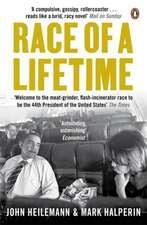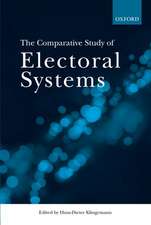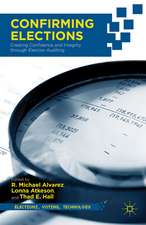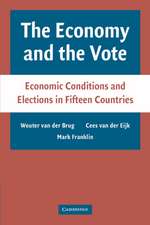Assumptions of the Tea Party Movement: A World of Their Own
Autor David Warfield Brownen Limba Engleză Hardback – 30 iun 2016
Preț: 384.86 lei
Nou
Puncte Express: 577
Preț estimativ în valută:
73.65€ • 76.46$ • 61.41£
73.65€ • 76.46$ • 61.41£
Carte tipărită la comandă
Livrare economică 24 martie-07 aprilie
Preluare comenzi: 021 569.72.76
Specificații
ISBN-13: 9781137521163
ISBN-10: 1137521163
Pagini: 165
Ilustrații: XVIII, 168 p.
Dimensiuni: 148 x 210 x 18 mm
Greutate: 0.34 kg
Ediția:1st ed. 2016
Editura: Palgrave Macmillan US
Colecția Palgrave Macmillan
Locul publicării:New York, United States
ISBN-10: 1137521163
Pagini: 165
Ilustrații: XVIII, 168 p.
Dimensiuni: 148 x 210 x 18 mm
Greutate: 0.34 kg
Ediția:1st ed. 2016
Editura: Palgrave Macmillan US
Colecția Palgrave Macmillan
Locul publicării:New York, United States
Cuprins
1. Assumptions—Their Use and Abuse .- 2. Self-Reliance Above All .- 3. Politics as “Dirty Business”? .- 4. Free Enterprise as Unassailable? .- 5. The Earth as Man’s Possession? .- 6. The Native-Born as Coming First? .- 7. Reconsidering Assumptions.
Notă biografică
David Warfield Brown teaches public management at the Milano School of International Affairs, Management, and Urban Policy at The New School, USA, and is the author of several books including America’s Culture of Professionalism (2014) and The Real Change-Makers (2012). He has been a lawyer on Wall Street, chief-of-staff on Capitol Hill, state commissioner in New York, deputy mayor of New York City, public authority board member, Professor at Yale University, USA, and The New School, USA, and President of Blackburn College, USA. He is the ongoing coeditor of the Higher Education Exchange, an annual publication of the Kettering Foundation. His primary research interest is the social dimensions of problem solving.
Textul de pe ultima copertă
This book presents a reassessment of the fundamental principles of the Tea Party movement. The Tea Party movement is largely associated with those who want a severely limited federal government spending far fewer taxpayer dollars. What gets less attention are the underlying Tea Party sentiments that, the book argues, are not so much false as they are terribly dated in light of the current national landscape. Such sentiments include prioritizing self-reliance, viewing politics as a “dirty business,” considering “free enterprise” unassailable, and believing the earth to be man’s possession. Brown skillfully and thoughtfully breaks from partisan considerations to get at the root of the movement, arguing that too many Tea Partiers are living in a world of their own, which, given so many pressing problems in the world, amounts to what Brown calls “sentimental mischief.”
















